If you had met William Upham, Jr., you couldn't help but think how close you came to some great moments in history.
In his strong handshake you could almost feel the presence of his father, a Civil War veteran who nearly died from his battlefield wounds; a man who met both President Lincoln and Jefferson Davis, the president of the Confederacy; and the 18th governor of Wisconsin.
All that history was only one generation away ...
Meet Wisconsin's True Son
Wisconsin's True Son, William (Bill) H. Upham, Jr., was born in 1916. He studied law at the University of Wisconsin before graduating and enlisting in the Army. He served as an officer in the 5th Infantry Division during World War II and was awarded the Bronze Star and Purple Heart.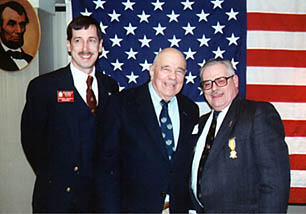 |
| Left to right: PDC Steve Michaels, True Son Bill Upham Jr., PCinC Danny Wheeler |
Bill was a past National commander of MOLLUS, serving for three years, 1985-88 and a founding member of the reactivated Iron Brigade Association, which was reorganized in December 1990. He served as president of the Milwaukee Civil War Round Table from 1989-91 and brought broad experience to his successful two terms. He is also a member of the Sons of Confederate Veterans.
Bill joined the Sons of Union Veterans of the Civil War in 1987. He served as Wisconsin Dept. Commander from 1990-1992, Dept. Treasurer 1992-99 and Commander of Madison's Henry Harnden Camp #2 in 1995 and '96. He also served as presenter of the Department's annual U.S. Grant award to a deserving Army ROTC graduate at Marquette University.
On August 20, 2009, at age 93, William H. Upham Jr. died in his home in Milwaukee, Wisconsin
Pvt. William Upham
Bill's father, William Sr., was born in Westminster, Massachusetts, on May 3, 1841, the son of Alvin and Sarah (Derby) Upham, the eighth of nine children. In 1850, his family moved to Niles, Michigan, where his father died in 1851. He came to Racine, Wisconsin, with his mother in 1853 and attended the school of Col. J.G. McMynn.
Bill says, "He was the youngest boy of the family and his oldest brother told him to come to Lincoln's call." William Upham, Sr., enlisted in Racine's Belle City Rifles in May 1861. The unit later became Co. F, 2nd Wisconsin Infantry, part of the famed Iron Brigade.
Bill recalled, "I used to sit on my father's lap while he talked with other veterans and they swapped war stories."
After training at Camp Randall, Madison, the regiment was ordered to Manassas Junction. On July 20, 1861, the 2nd Wisconsin lost 16 killed and 35 wounded in the battle at Centerville, near Bull run...one of the wounded was William Upham.
"He got a minnie ball bullet in the chest and was left for dead. It was three days without any medical treatment." His recovery from battle injuries began when another man, thinking Upham was dead, tried to take the wounded man's shoes. Upham stopped the shoe thief by summoning the strength to say '" hope to wear those shoes one day.'"
The minnie ball came out near the backbone, four inches down the back. Had the ball varied 1/2 inch, it would have struck a large vein in the neck and he would have bled to death. the younger Upham remembers when he was quite small that he could not cover the scar on his father's back with both of his hands.
About 12 days later, he was transported to Richmond, Virginia, as a prisoner of war. From his cell window, he recalled seeing Jefferson Davis riding by on his horse. That wasn't the last he'd see of the Confederate president.
When news of the battle reached Racine, William Upham and three others were reported dead and a funeral service was held. Subsequently, it was learned that Upham had been taken prisoner.
Meeting Lincoln and Davis
In the Spring of 1862, after seven months in prison, William Upham was exchanged, paroled and returned to Washington. It was there that Senator Doolittle, a fellow townman of Upham's invited him to call upon President Lincoln. After introductions, Lincoln asked Upham about the treatment of prisoner at Richmond and about the nature of his wound.
"My father met Mr. Lincoln and the president asked him to take off his shirt to see his wound. We always say that he was the first Upham to lose his short to the president," Bill said with a chuckle.
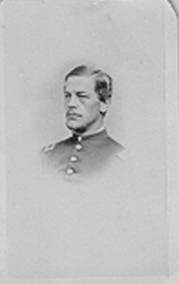 |
| Lt. William Upham |
William Upham, Sr., graduated from West Point in 1866 as a 2nd lieutenant and was assigned to the 5th U.S. Artillery. The unit was on duty at Fortress Monroe, where Jeff Davis was being held in custody, pending his trial. As Officer of the Guard, Upham had an opportunity to obtain a thorough knowledge of the character of the fallen Confederate chief.
"The topography of Wisconsin was more familiar to him than to me, a boy who had lived almost all his life in Wisconsin," the elder Upham recalled. Davis had been stationed at Green Bay and at Prairie du Chien in frontier Wisconsin as a young soldier. He knew the meaning of all the Indian names. He was never bitter or vindictive.
Bill often remarked, "My father had the distinction of meeting and talking to both Lincoln and Davis."
Upham served in Pensacola, Florida, before being transferred to the 4th U.S. Battery in 1867. In 1869, he was promoted to 1st lieutenant and resigned his commission within the same year.
He married Mary C. Kelley of Racine on December 19, 1867. They had no children, except for two adopted daughters.
Marshfield Businessman
After leaving the service, Upham returned to Wisconsin and entered the employ of Sauson and Grimmer Lumber Company at Kewaunee, where he stayed for two years. In 1871, he and his brother, Charles, built a saw mill at Angelica in Shawano County, which they operated until 1879. Marshfield was platted and organized that year and the elder Upham located a lumber mill, a grist mill and a furniture factory there. These were the nucleus of an unprecedented influx of population and business.
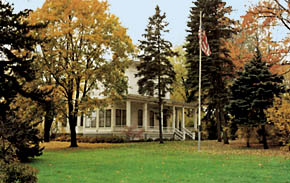 |
| Upham mansion in Marshfield |
Then on June 27, 1887, a fire roared through Marshfield, leaving the Upham Manufacturing Company in ashes. Upham promptly raised a pole on the site of the burned factory and ran up the stars and stripes, declaring that the business and the city would rebuild. During the hours of terror and despair following the fire, it was Upham who used his influence, telegraphing friends far and wide for assistance in helping the homeless and those without food. Within six months, most of the city had rebuilt itself in solid brick and stone. The Upham Manufacturing Company grew to employ 500 and do $600,000 in business annually.
Upham as GAR Officer
William H. Upham, Sr., founded the James G. Blaine GAR Post #110 in Marshfield, which was chartered on October 23, 1883. Upham served as its first commander and was re-elected several times. He served as an Aid on the Staff of GAR Wisconsin Dept. Co. Lucius Fairchild (1886) with the rank of Major. In March 1891, he himself was elected Department Commander.
After the death of President Garfield in 1881, Upham was appointed by President Arthur on a commission to visit the Annapolis Naval Academy.
Governor Upham
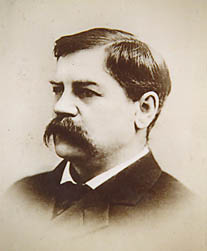
In 1894, he ran a successful campaign for governor. He reportedly paid for his own inauguration in 1895 because the state was still financially depressed after the Panic of 1893. His two-year term included the erection of the State Historical Library building and the signing of the first Wisconsin Civil Rights legislation.
While governor, he left his business to his brother-in-law, who made some bad decisions and cost the company $90,000--a tidy sum in those days. The elder Upham was forced to rebuild again. He did so by selling his lumber holdings and concentrating on the furniture business.
Recollections of his father
His wife, Mary, died in 1912 and the elder Upham, now the owner of a 50-foot yacht, took a trip down the Mississippi River, around the Gulf of Mexico and up the Atlantic coast. When he got to North Carolina, a storm damaged his ship. While waiting for repairs, he met and later married his second wife. When he was 75 and his wife was 30, William Jr. was born.
"In no respect was I a 'mama's boy'" said Bill. "I was totally spoiled by my father. When he died, I knew life would not be the same." The younger Upham remembered going to the office with his dad and licking stamps, going to the post office and on daily trips to the barber shop, where his dad would get shaves. He also remembered car trips and sitting on his dad's lap while the chauffeur drove.
"My recollections of him are very good."
William H. Upham Sr. died on July 2, 1924, at the age of 83.
Author
Sources
PDC Steve Michaels
Soldiers & Citizens Album of Biographical Record, 1888
Milwaukee Sentinel, March 1, 1891
Milwaukee Journal, September 27, 1990
C.K. Pier Badger Camp #1 patriotic presentation, October 3, 1996
Racine Journal Times, November 6, 1998
Brookfield News, April 6, 2000
Read the memorials to Wisconsin's other departed True Sons Al Lang and James F. Sullivan.
Sons of Union Veterans of the Civil War
Department of Wisconsin
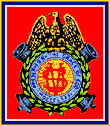
Comments to Dept. Signals Officer
Last Updated: